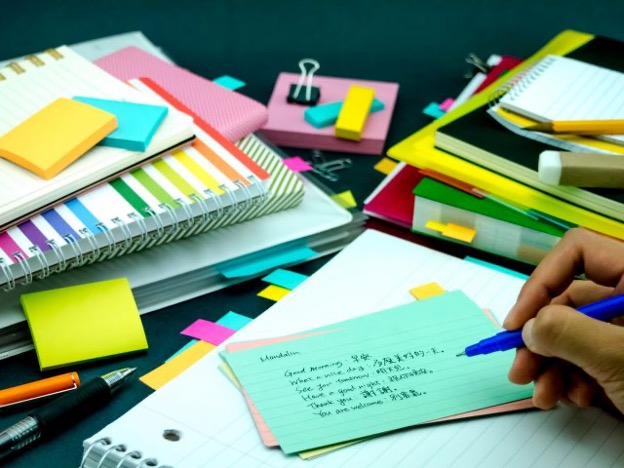Navigating university life can be challenging, especially when faced with a demanding course load and the pressure to perform well academically. While it may be tempting to rely on last-minute cramming or re-reading your notes, these strategies are often not as effective as we think. Fortunately, research has uncovered more efficient study techniques that can help you retain information better and ace your exams. Here are some study hacks that actually work, backed by cognitive psychology and educational research.

1. Ditch Cramming: Embrace Spaced Repetition
Cramming may seem like a quick fix for a looming exam, but it’s not effective for long-term retention. Studies suggest that while students might perform well on tests immediately following a cramming session, they often fail to retain the material over time (Parsons, 2022). Instead, spaced repetition—a technique where you review information at gradually increasing intervals—is proven to be far more effective. This approach allows your brain to consolidate information over time, leading to better recall in the long run (Putnam et al., 2016).

2. Plan Your Study Sessions and Set SMART Goals
One of the most common mistakes students make is procrastinating and leaving studying until the last minute. To counter this, set specific, measurable, attainable, realistic, and time-specific (SMART) goals for your study sessions. For example, rather than vaguely planning to “study for cognitive psychology,” set a goal like, “I will study Chapter 5 for 30 minutes every day at 7 p.m.” Research from Harvard suggests that having a clear study plan with set goals not only boosts preparedness but also helps in maintaining consistency, which is crucial for academic success (Parsons, 2022).
3. Use Active Learning Techniques
Highlighting text and re-reading notes are popular study habits, but they are often time-consuming and do not necessarily lead to deeper understanding. Research shows that active learning techniques, such as self-quizzing and teaching the material to someone else, are much more effective. These strategies force you to actively engage with the material, making it easier to recall later (Putnam et al., 2016). When you quiz yourself, you’re not just passively reviewing; you’re practicing retrieval, which strengthens your memory (Lineweaver et al., 2022).

4. Test Yourself Regularly
Testing isn’t just for exams—it’s also one of the best ways to study. Self-testing, or practice testing, helps reinforce what you’ve learned and identifies areas where you need to focus more. According to cognitive psychology research, students who regularly test themselves retain more information and perform better on actual exams compared to those who simply re-read their notes (Putnam et al., 2016). Flashcards, practice quizzes, and even writing out key points from memory are excellent ways to incorporate this into your study routine.
5. Find Your Ideal Study Environment
Your study environment can significantly impact your focus and productivity. A quiet, distraction-free space with all your materials on hand is ideal for effective studying. Research has shown that multitasking, like studying in a busy café or with social media notifications popping up, can significantly hinder learning and retention (Putnam et al., 2016). Consider turning off your phone or using apps that block distracting websites while you study.

6. Take Regular Breaks
The human brain can only focus effectively for about 25 to 30 minutes at a time. Taking short breaks in between study sessions helps reset your mind and improves your ability to absorb information. The Pomodoro Technique—studying for 25 minutes followed by a 5-minute break—can be particularly effective. Harvard researchers also highlight the importance of wakeful rest in consolidating memories and enhancing learning (Parsons, 2022).
7. Be an Active Reader
Instead of passively skimming through chapters, engage with the material actively. Before you begin reading, try to recall what you already know about the topic. As you read, jot down questions, summarize sections in your own words, and make connections to other concepts you’ve learned. This process, known as metacognition, involves being aware of and reflecting on your own learning process. By actively thinking about how you’re learning, you can identify the most effective study methods for yourself, which ultimately helps you understand and retain information more deeply (Putnam et al., 2016).
8. Study Smarter, Not Harder
It's not about how much time you spend studying, but how effectively you use that time. Techniques such as elaborative interrogation (asking yourself why a fact is true) and self-explanation (teaching the material to yourself or others) can significantly enhance your learning efficiency (Lineweaver et al., 2022). These methods encourage deeper engagement with the content and help solidify your understanding, making your study sessions more productive.
While these study hacks are proven to be effective, it's important to remember that every learner is different. What works well for one student might not be as effective for another. Experiment with these techniques and find the combination that suits your unique learning style. Additionally, don’t forget to prioritize your well-being. Adequate sleep, proper nutrition, and regular exercise are just as crucial to your academic success as the time you spend studying. By balancing effective study habits with self-care, you'll not only improve your grades but also maintain a healthier, more sustainable approach to your education.

